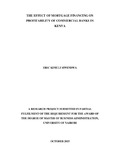| dc.contributor.author | Mwendwa, Eric K. | |
| dc.date.accessioned | 2015-12-22T06:46:52Z | |
| dc.date.available | 2015-12-22T06:46:52Z | |
| dc.date.issued | 2015 | |
| dc.identifier.uri | http://hdl.handle.net/11295/93955 | |
| dc.description | A research project submitted in partial fulfilment of the requirement for the award of
the degree of master of business administration, university of Nairobi | en_US |
| dc.description.abstract | The mortgage market in Kenya has been rising over time which has seen growth in
profitability of the commercial banks that have been offering mortgage financial
services to Kenyans. Advancing mortgage credit implies that the commercial bank
money is tied up somewhere whose payment is in the future. This study sought to
determine the effect of mortgage financing on the profitability of commercial banks in
Kenya. To achieve the objective of the study, a descriptive research design was used.
The population of this study included all the 43 Commercial Banks in Kenya. The
sample size of this study involved all commercial banks that offered mortgage
financing between years 2010 to 2014. The secondary data was sourced from the
annual reports available from the Central bank of Kenya. Data analysis was done
using a regression model to test the influence of various variables on the profitability
of commercial banks in Kenya. The correlation results found that firm size was
moderately correlated to profitability of commercial banks in Kenya. The study found
that firm size was statistically significant in explaining the effect mortgage financing
on profitability of commercial banks in Kenya. Further, it was revealed that operating
efficiency, capital adequacy and liquidity were found to be statistically insignificant.
The study recommends that central bank of Kenya and other policy makers should use
the empirical findings obtained from this study as a guide to promote policies that
create a conducive atmosphere for commercial banks to grant their customers
mortgage loans as a way of enhancing profitability of commercial banks in the longterm. The limitations experienced in the study was the reliance on secondary data only
thus some issues that could have arisen if primary data was used could not be
analyzed. Mortgage financing is mostly used to finance capital projects which are
long-term in nature and whose maturity period exceeds ten years in most cases. The
study therefore recommends that future researchers interested in this field of study
should consider increasing the period of study to ten or twenty years in order to obtain
more conclusive results. Then, findings may be compared upon which reliable
conclusions can be drawn. | en_US |
| dc.language.iso | en | en_US |
| dc.publisher | University of Nairobi | en_US |
| dc.title | The Effect of Mortgage Financing on Profitability of Commercial Banks in Kenya | en_US |
| dc.type | Thesis | en_US |

